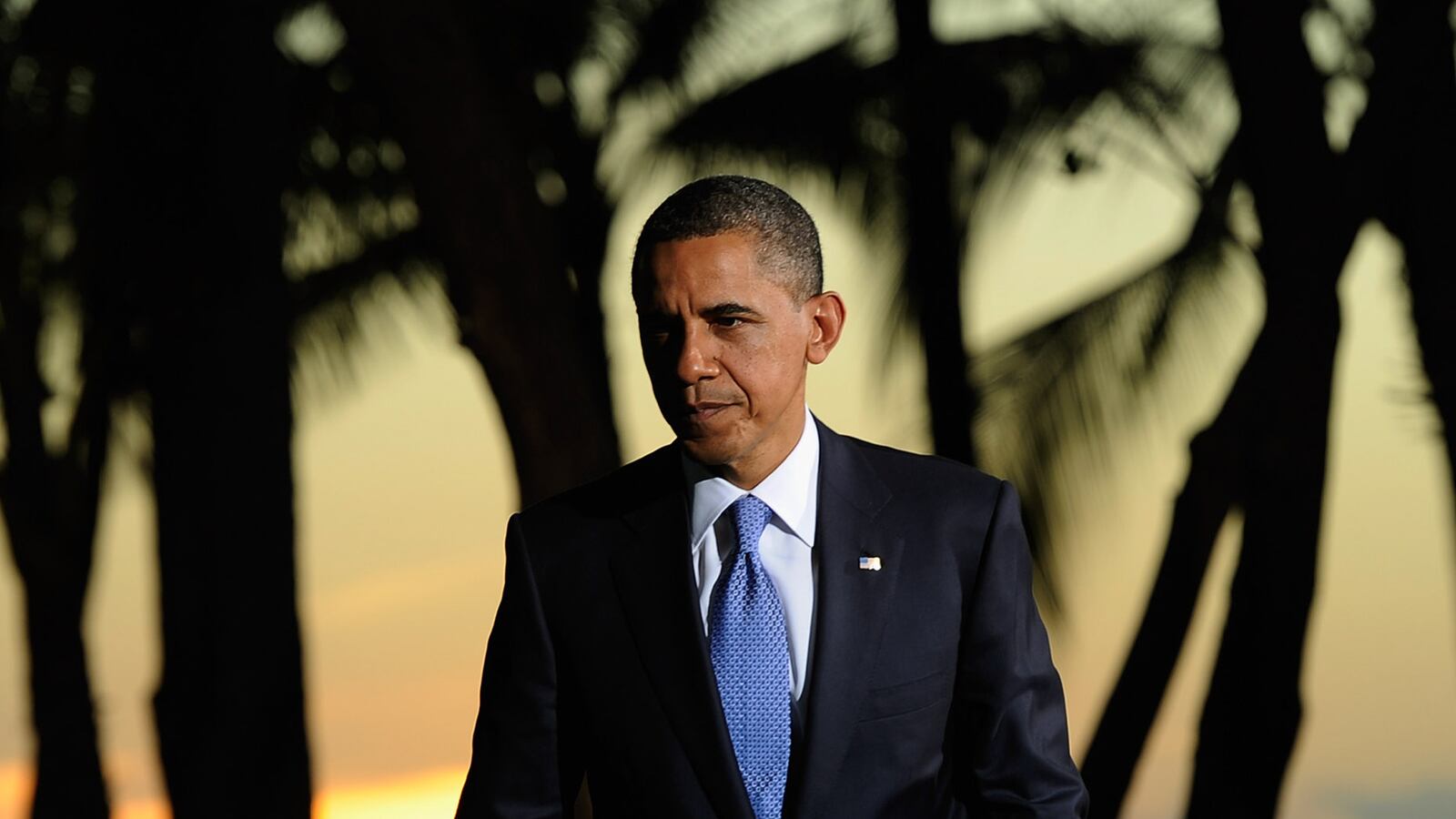When Barack Obama vaulted onto the national stage a decade ago, part of his appeal was that he seemed to be from so many places at once. All corners of the country could lay claim to him: He was Hawaiian by birth, Illinoisan by choice, and Kansan by heritage, and he spent his formative years in New York City. He marched through the 2008 primaries by winning in both the deep red states that Democrats typically eschewed and urban centers populated by low-income voters and young progressives.
Now, six years into his presidency and with his popularity fading, it seems Obama is having trouble finding a place to call home. In state after state that once called the president its favorite son, he is finding that his political advocacy is unwelcome.
Consider Hawaii, where Obama was born, lived until he was 6, and returned to finish grade school and high school, and where he still vacations with his family every holiday season. In the Aloha State, Obama has endorsed and cut a radio ad for Neil Abercrombie, the incumbent governor.
“He knew my parents before I was a twinkle in their eye, and he was one of the first people anywhere to step up and support me for president. So you could say that Gov. Abercrombie has had my back since before I was born,” Obama says in the unusually personal radio spot. “His commitment to Hawaii runs deep, just like mine. I value him as a partner, and because of Neil’s work, Hawaii’s best days are ahead.”
But despite Obama’s testimonial, Hawaiians seem set to turn their backs on Abercrombie; he trailed his previously little-known opponent, state Sen. David Ige, by nearly 20 points ahead of Saturday’s Democratic primary. That same day, Brian Schatz, whom Abercrombie appointed to the Senate in 2012 to replace the legendary Daniel Inouye, will face challenger Colleen Hanabusa, a congresswoman long groomed to be Inouye’s successor. Obama voiced his support for Schatz all the way back in March, calling him “The right choice to continue delivering for Hawaii,” and at the time The Washington Post called the endorsement one of the few big enough to move the needle in a competitive election.
But a poll released Monday gave Hanabusa a 3-point lead, after she had trailed for much of the campaign.
Political analysts say Saturday’s election could end in a result rarely seen in American politics: an incumbent president making not one but two endorsements in a primary in his home state (or one of them, at least) and losing both.
“This is certainly a place where his endorsement remains welcome,” said Neil Milner, a Hawaii-based political consultant. “No one here hides from the fact that they know Obama. But [his endorsements] have certainly not moved the needle in any real way.”
To be sure, Obama has not spent much political capital or much time out on the trail for Abercrombie or Schatz. And Hawaii politics has a tendency to mostly ignore mainland trends and issues.
But it’s not just Hawaii where the Obama touch isn’t turning candidacies into winners. In Illinois in 2010, Mark Kirk became only the second Republican in the state since the 1980s to win a U.S. Senate seat, taking Obama’s old seat. The president campaigned and fundraised for Kirk’s opponent, state treasurer Alexi Giannoulias, but it was not enough to overcome a Tea Party wave and the stench of then-Gov. Rod Blagojevich auctioning off the seat to the highest bidder.
But now Obama’s old stomping grounds, a state where Democrats enjoy a 15-point registration advantage, is in danger of becoming decidedly purple. The incumbent governor, Pat Quinn, whom Obama backed in 2010, is trailing his Republican opponent by double digits.
According to Paul Green, the director of the Institute for Politics at Roosevelt University and a political analyst for WGN Radio, Obama was never one to wave the pompoms for his fellow Illinois Democrats, and that hands-off approach means that he does not have much sway when election time comes.
“He has never been a party guy. He’s not a rebel, but it is just like it is down in Washington. He is a University of Chicago guy. He’s aloof,” Green said. “He is not a schmoozer. He is good at it, but he doesn’t like it.”
This notion of Obama the outsider is what carried him to the White House, but it also helps explain why he struggles to give much boost to his chosen candidates. That holds true for Hawaii, where, according to Colin Moore, political science professor at the University of Hawaii, what is noticeable to local politicos is not that Obama made two primary endorsements but that he made two primary endorsements that go against the Japanese-American political machine that dominates the islands’ politics.
“The most interesting story here is that Obama is going against the old Inouye machine,” Moore said. “He is backing outsiders, and that is extraordinary, even though he is the president.”
The same dynamic, in a more limited way, is playing out in New York City, which has a smaller claim to the president—he spent his last two years of college there and lived in Harlem briefly after school before decamping to Chicago—but which has made a bid on hosting Obama’s presidential library and is a city where Obama has mused aloud about moving to after his time at the White House is up.
In 2010, Obama suggested that Rep. Charlie Rangel, whose tenure stretches back so far that Obama likely voted for him when he lived uptown, step down rather than face a series of ethics investigations. The suggestion became a talking point for Rangel’s re-election bid in 2010, then again in 2012, and then a third time in 2014. He won all three elections, in spite of the president’s apparent disapproval.






